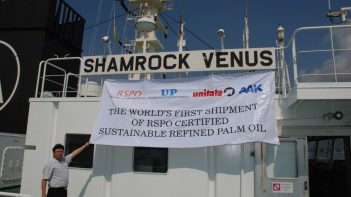Since the RSPO Trademark was launched in 2011, it has grown exponentially from 12 countries to 60 countries, and now appears on 400 over consumer products.
The RSPO Trademark is now more sought after by the Supply Chain Associates and Ordinary Consumer Goods Manufacturers, which shows that these smaller niche end-producers and those selling to conscious consumers feel there is a need in the market to demonstrate that they produce products and support organisations that have taken steps to eliminate environmental degradation and human rights issues.
The trademark, while not without its own controversy, has recently seen rapid growth in the last six months, with almost 140 new trademark applications received from RSPO members.
“The use of the RSPO Trademark in Latin America has begun to gain momentum as certification increases rapidly for both producers and supply chain members, particularly with refineries and consumer goods manufacturers in the region. This is evidence that the market has begun to demand RSPO certified sustainable palm products,” said Director of Latin America, Francisco Naranjo.
And while the organisation always encourages the use of the RSPO Trademark on members’ products, some Consumer Goods Manufacturers feel that the logo can confuse consumers as palm oil is just a small ingredient of the product. However, we urge consumers to influence manufacturers by asking them to use the RSPO Trademark, if they are not already, or by supporting through their daily purchasing decisions by looking out for products that carry the RSPO Trademark. By choosing products made with certified sustainable palm oil, consumers – given the opportunity by manufacturers – can be a key factor in transforming the industry.
In Europe and somewhat in the United States, mainstream consumers are starting to take note of where their ingredients are sourced and what impact these ingredients may have on the environment. The Amazon fires that occured in 2019 were a great wake up call for businesses to have sustainability initiatives and goals.
Dr. Inke van der Sluijs, the Head of European Operations said, "In the past, RSPO has been a business to business conversation. RSPO members have taken their responsibility by producing and trading palm oil that respects biodiversity, forests, and human rights – now is the right time for consumer engagement by using the RSPO Trademark on products."
Currently, there are already over 900 companies who produce and source for RSPO Certified products, which is recognised for environmental, social, and economic sustainability.
"The recent growth in the trademark has been impressive, and it shows that companies are starting to get to a place where they are willing to talk to the consumer about palm oil and the fact that it is in their products. I give credit to our membership for endorsing the 2018 Principles and Criteria and for their further efforts on transparency. We must shift consumer focus from one of boycotting palm oil to one that actively supports sustainable palm oil. The trademark is an easy way to communicate this message,” said Interim Director of Outreach & Engagement, Dan Strechay.
With the rapid increase of the RSPO Trademark usage globally, it is enough to say that many organisations are committing towards transparency and more sustainable practices by using the RSPO Trademark logo on their products and general corporate communications.
Find out more today about how you or your organisation can use the RSPO Trademark by contacting [email protected].
Keep reading

RSPO hosts first Africa downstream sustainable palm oil supply chain forum in Cape Town

Nearly two decades on, Europe continues to drive global demand for RSPO Certified Palm Oil

Communicating Sustainable Palm Oil - examples of success across Europe
[EOT] Terms of Reference: Independent Smallholders Outreach Programme in Indonesia

RT2023 Delegates Propose Solutions to Reinforce RSPO’s Assurance System – End-Year Highlights of Assurance Standing Committee
RSPO UK Members' Day Examines Shifting Dynamics of Doing Business within Europe

Celebrating 20 Years of RSPO’s Sustainability Journey




